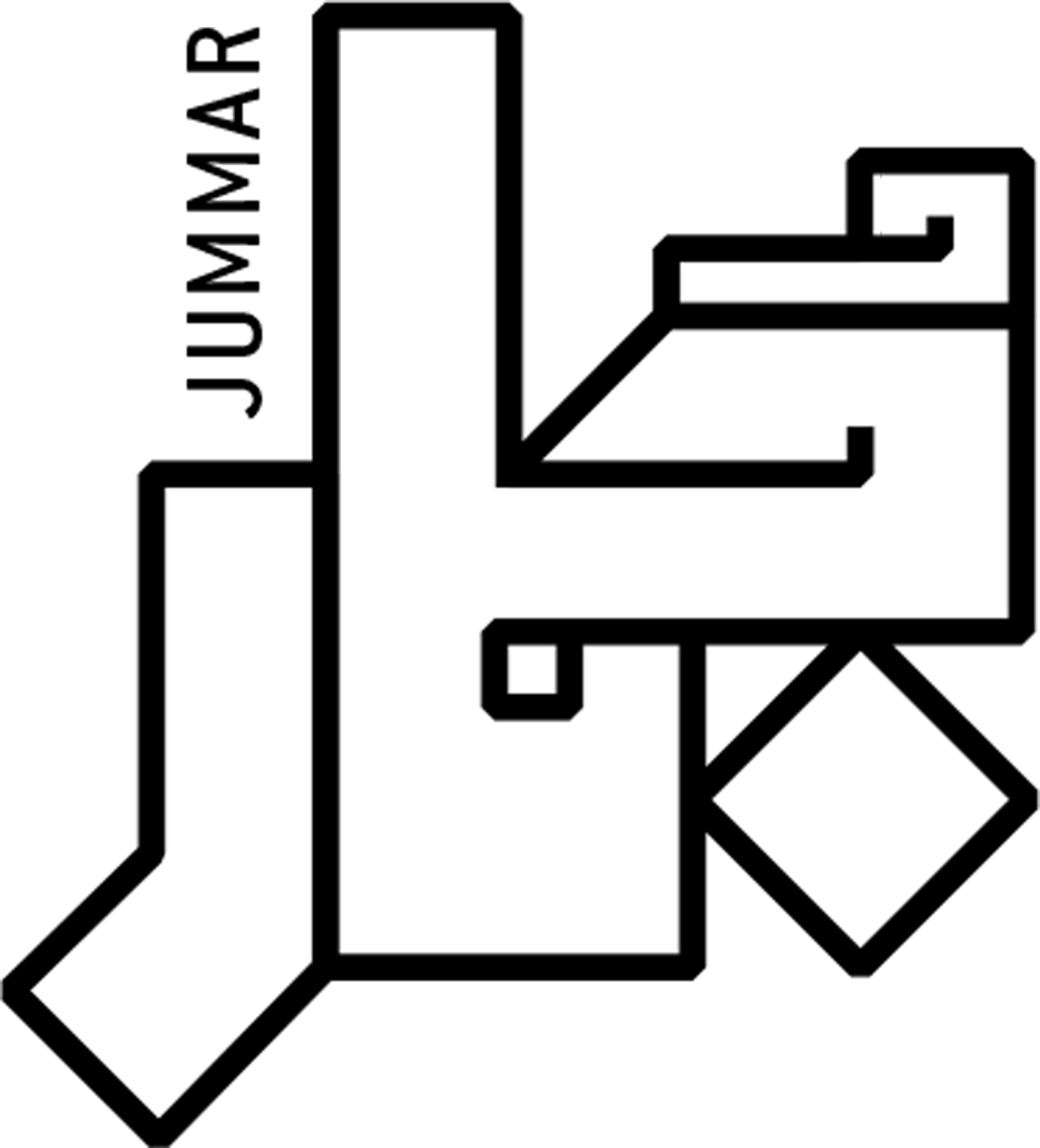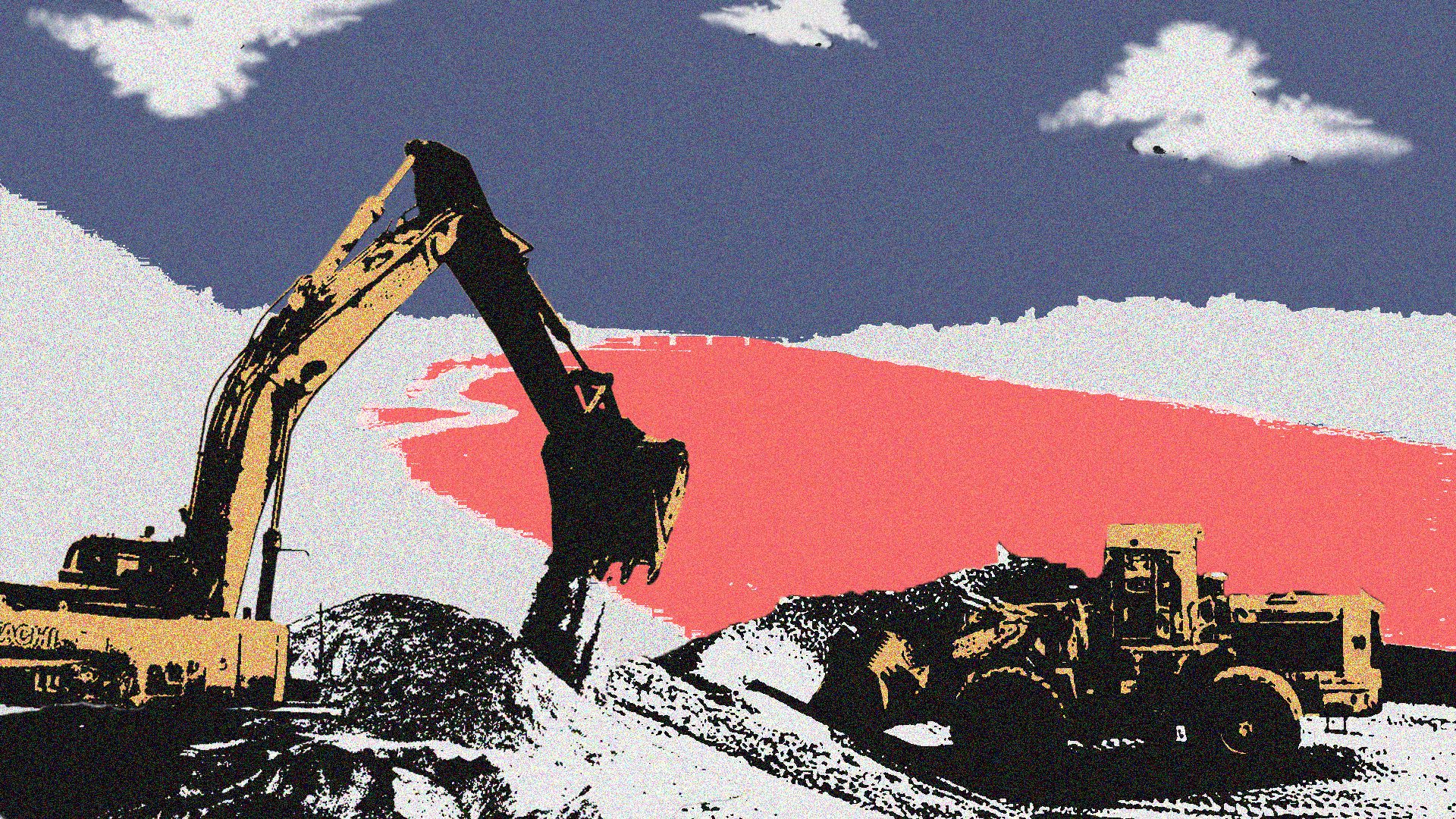Al-ʿAsa’ib’s Business Ravages the Banks of the Tigris
01 Feb 2023
Around 50 quarries are scattered in the Tigris River and on its banks in the city of Mosul, with giant excavators desiccating it and making its aquatics vulnerable to extinction. But money, power, and the impulsion to return and rebuild, are the key drivers behind the continuation of this process that ravages the river and threatens its future.
The banks of the Tigris River are being torn down along its route through Mosul by dozens of excavators and bulldozers, with the aim of extracting stone and sand from the sides and depths of the parched and dwindling river. Every day, after excavators disgorge the river banks from their contents, which are to be used to produce construction materials, an earthen shaft can be distinctly seen in the middle of the riverbed. The deadly process of draining the soul of the Tigris is happening with the full knowledge of citizens and even officials, but very few can effectively protest against this destructive process. This is due to the two main elements in this equation: profiteering and factions, and wherever there is gold, factions follow. The presence of these two essential features makes fear spread like a virus among people.
The Background Story
In July 2017, ISIS was defeated and expelled from Mosul, leaving long-lasting physical and psychological wounds that still fester in the city. Ridding Mosul from Jihadists was at a great cost; some parts of the city were destroyed entirely while others were severely damaged. Afterwards, people just wanted to return after years of excruciating displacement that crushed their bodies and souls.
The number of returnees rose, which accelerated the reconstruction process and the demand for building materials, which were in low supply. This led to prices increasing by 59 percent, according to Suleiman Hamid, a contractor from Mosul. When the ʿAsa’ib Ahl al-Haq faction became aware of this shortage, it began digging quarries for gravel and sand on the banks of the Tigris and in this way started trading. Al-ʿAsa’ib was one of the factions which fought to liberate Mosul from the grip of ISIS, after which it became a main player in the political, economic and security management of the city.
Between 2017 and 2019,ʿAsa’ib Ahl al-Haq undertook quarrying operations in Mosul. According to an administrative employee at the Water Resources Department in Mosul, when asked about the profit gained from these quarries he said, “Quarry excavators produce gold”. The Al-ʿAsa’ib faction does not own these quarries; it only manages and protects them in exchange for a monthly percentage of each quarry’s profit, or for a lump sum from the owners. Managing the faction’s economic affairs is the responsibility of a committee which has been convened in the city under the name of the “Economic Office”. The only known members of this committee are ʿOmar Riyad Abdullah, Muhammad Salah Hassan, Rabieaʿ Riyad ʿAbdullah and ʿAbdul- ʿAziz ʿAbdul-Sattar Rashid. Potential contractors inform committee members about the location of new quarries in Mosul, then the monthly amount due to Al-ʿAsa’ib is determined. Thus, the deal is made and the excavation of a new quarry begins on the Tigris. A car belonging to Al-ʿAsa’ib arrives on a specific day at the end of each month to do a round of all the quarries and collect Al-ʿAsa’ib’s monthly share, which none of the witnesses would speak about.
Excavators have now reached the small islands that have started to form in the Tigris due to the river’s low levels. In 2020, the Directorate of Water Resources in Nineveh began managing the process of organising the quarries without taking any other action that would potentially preserve the river. Both the directorate and Al-ʿAsa’ib continued to divide the work, with the first fixing the legal work, and the latter managing the field work.
The Profits
The directorate did not consider the formation of land masses in the middle of the river to be a threatening indicator for its future. Instead, it considered this a source of financial gain and began renting out the islands for the development of quarries. According to sources in the directorate, the lowest price paid for an island was 25 million dinars. However, there are also bribes paid to the directorate and commission for Al-ʿAsa’ib. We tried to obtain information from the quarries’ owners regarding their work, how they get licences, and how they give Al-ʿAsa’ib a monthly commission, but most of them refused to answer. One of those who was forthcoming, without, however, giving details, said that he set up his quarry on the western bank of the Tigris. He stated, “Everyone pays, and whoever doesn’t, has his quarry dismantled”. When asked about to whom he pays, he only answered, “to the factions, of course”, and left. We were able to count 50 quarries installed along the Tigris River within the borders of Mosul, and there are more spreading on its banks all the way to the Qayyarah district.
A field researcher working on monitoring the quarries said, “The owner of each quarry pays more than 3,000 dollars monthly to the plutocrats”. But what about the quarries, their establishment costs, their profit and the amount they extract from the banks each day? We asked the owners. According to them, the cost of establishing a single quarry is estimated to reach 300,000 dollars, as excavators, equipment and bulldozers are expensive, as well the supply of fuel to these machines. Each quarry produces an average of 150 cubic metres of various materials that can be used in construction.
Impact on the Tigris
The view of the Tigris in Mosul no longer resembles that which residents used to see. Water levels have decreased, and islands have appeared in the middle of the river. Later these islands began disappearing, along with the two banks of the river due to erosion. Moreover, the muddy water caused by the quarries has affected water supply projects to Mosul’s residential neighbourhoods, as well as the quality of the Tigris’s water. This has resulted in brown-coloured water being supplied to many homes. Hazim Muhammad, Director of Nineveh Water, explained, “The continuous work of the quarries has exacerbated the effects of low water levels, as water mixes with the extracted materials. It then reaches low-level pumping stations in a very turbid state, which has made the summer difficult”. According to engineer, ʿAmmar Hamid, granting licences to the quarries must be in accordance with regulations, which include preventing their establishment between two bridges or near drinking water pipes.
Besides the destruction on both riverbanks by the quarries, environmentalists have warned of other consequences regarding aquatic life in the Tigris. Nashwan Shaker, an employee at the Nineveh Environment Department, relates that “the increase in quarries causes a number of environmental changes in the river, such as flow velocity. It also affects aquatic organisms due to the increasing levels of algae that reduces the level of dissolved oxygen, and thus impacts fish stocks”. The representative of Nineveh, Luqman Al-Rashidi, agrees about the environmental damage of the quarries on the river. He also added, “Quarries operate near and between bridges, which poses a threat to the pillars supporting them”. According to the deputy, most of the quarries operate unofficially. He added, “There are pressures to pursue this work. I have conveyed the severity of the effects of these quarries to the Prime Minister and demanded his personal intervention to stop them”.
Nineveh’s dissatisfaction
“Quarry licences are often granted directly from the Ministry of Water Resources without referring to the local government of Nineveh, although it should be consulted before granting licences to the owners”, said Rʿaad al-ʿAbbasi, a spokesman for the Nineveh government.
The local government is dissatisfied with the Water Resources Directorate monopolising the granting of licences, which is administratively attached to the Federal Ministry of Water Resources. Muhammad Al-ʿAbd Rabbuh, a member of Parliament for Nineveh Governorate, said that many quarries are controlled by the economic interests of political parties. He added, “The local government did not step in until river degradation started appearing, but it was unable to take any action…many observations have been documented regarding the quarries destroying the Tigris River, and the fact that these quarries are affiliated with armed factions.”
Translated by Mariam Morsy.
Read More

“She Brought a Fatwa from Khamenei and Al-Azhar, But It Went Nowhere”: The Struggles of Trans People in the Iraqi Health Sector

“Everyone has a Right to the Kids Except their Mother”: On Women Fighting for the Custody of Their Children

Iraqi Prisoners Blackmailed to Pay To Obtain Release Papers After Completing Their Sentence

“We Have to Make a Living Somehow”: Women Working Hard under the Heat of Dhi Qar
The banks of the Tigris River are being torn down along its route through Mosul by dozens of excavators and bulldozers, with the aim of extracting stone and sand from the sides and depths of the parched and dwindling river. Every day, after excavators disgorge the river banks from their contents, which are to be used to produce construction materials, an earthen shaft can be distinctly seen in the middle of the riverbed. The deadly process of draining the soul of the Tigris is happening with the full knowledge of citizens and even officials, but very few can effectively protest against this destructive process. This is due to the two main elements in this equation: profiteering and factions, and wherever there is gold, factions follow. The presence of these two essential features makes fear spread like a virus among people.
The Background Story
In July 2017, ISIS was defeated and expelled from Mosul, leaving long-lasting physical and psychological wounds that still fester in the city. Ridding Mosul from Jihadists was at a great cost; some parts of the city were destroyed entirely while others were severely damaged. Afterwards, people just wanted to return after years of excruciating displacement that crushed their bodies and souls.
The number of returnees rose, which accelerated the reconstruction process and the demand for building materials, which were in low supply. This led to prices increasing by 59 percent, according to Suleiman Hamid, a contractor from Mosul. When the ʿAsa’ib Ahl al-Haq faction became aware of this shortage, it began digging quarries for gravel and sand on the banks of the Tigris and in this way started trading. Al-ʿAsa’ib was one of the factions which fought to liberate Mosul from the grip of ISIS, after which it became a main player in the political, economic and security management of the city.
Between 2017 and 2019,ʿAsa’ib Ahl al-Haq undertook quarrying operations in Mosul. According to an administrative employee at the Water Resources Department in Mosul, when asked about the profit gained from these quarries he said, “Quarry excavators produce gold”. The Al-ʿAsa’ib faction does not own these quarries; it only manages and protects them in exchange for a monthly percentage of each quarry’s profit, or for a lump sum from the owners. Managing the faction’s economic affairs is the responsibility of a committee which has been convened in the city under the name of the “Economic Office”. The only known members of this committee are ʿOmar Riyad Abdullah, Muhammad Salah Hassan, Rabieaʿ Riyad ʿAbdullah and ʿAbdul- ʿAziz ʿAbdul-Sattar Rashid. Potential contractors inform committee members about the location of new quarries in Mosul, then the monthly amount due to Al-ʿAsa’ib is determined. Thus, the deal is made and the excavation of a new quarry begins on the Tigris. A car belonging to Al-ʿAsa’ib arrives on a specific day at the end of each month to do a round of all the quarries and collect Al-ʿAsa’ib’s monthly share, which none of the witnesses would speak about.
Excavators have now reached the small islands that have started to form in the Tigris due to the river’s low levels. In 2020, the Directorate of Water Resources in Nineveh began managing the process of organising the quarries without taking any other action that would potentially preserve the river. Both the directorate and Al-ʿAsa’ib continued to divide the work, with the first fixing the legal work, and the latter managing the field work.
The Profits
The directorate did not consider the formation of land masses in the middle of the river to be a threatening indicator for its future. Instead, it considered this a source of financial gain and began renting out the islands for the development of quarries. According to sources in the directorate, the lowest price paid for an island was 25 million dinars. However, there are also bribes paid to the directorate and commission for Al-ʿAsa’ib. We tried to obtain information from the quarries’ owners regarding their work, how they get licences, and how they give Al-ʿAsa’ib a monthly commission, but most of them refused to answer. One of those who was forthcoming, without, however, giving details, said that he set up his quarry on the western bank of the Tigris. He stated, “Everyone pays, and whoever doesn’t, has his quarry dismantled”. When asked about to whom he pays, he only answered, “to the factions, of course”, and left. We were able to count 50 quarries installed along the Tigris River within the borders of Mosul, and there are more spreading on its banks all the way to the Qayyarah district.
A field researcher working on monitoring the quarries said, “The owner of each quarry pays more than 3,000 dollars monthly to the plutocrats”. But what about the quarries, their establishment costs, their profit and the amount they extract from the banks each day? We asked the owners. According to them, the cost of establishing a single quarry is estimated to reach 300,000 dollars, as excavators, equipment and bulldozers are expensive, as well the supply of fuel to these machines. Each quarry produces an average of 150 cubic metres of various materials that can be used in construction.
Impact on the Tigris
The view of the Tigris in Mosul no longer resembles that which residents used to see. Water levels have decreased, and islands have appeared in the middle of the river. Later these islands began disappearing, along with the two banks of the river due to erosion. Moreover, the muddy water caused by the quarries has affected water supply projects to Mosul’s residential neighbourhoods, as well as the quality of the Tigris’s water. This has resulted in brown-coloured water being supplied to many homes. Hazim Muhammad, Director of Nineveh Water, explained, “The continuous work of the quarries has exacerbated the effects of low water levels, as water mixes with the extracted materials. It then reaches low-level pumping stations in a very turbid state, which has made the summer difficult”. According to engineer, ʿAmmar Hamid, granting licences to the quarries must be in accordance with regulations, which include preventing their establishment between two bridges or near drinking water pipes.
Besides the destruction on both riverbanks by the quarries, environmentalists have warned of other consequences regarding aquatic life in the Tigris. Nashwan Shaker, an employee at the Nineveh Environment Department, relates that “the increase in quarries causes a number of environmental changes in the river, such as flow velocity. It also affects aquatic organisms due to the increasing levels of algae that reduces the level of dissolved oxygen, and thus impacts fish stocks”. The representative of Nineveh, Luqman Al-Rashidi, agrees about the environmental damage of the quarries on the river. He also added, “Quarries operate near and between bridges, which poses a threat to the pillars supporting them”. According to the deputy, most of the quarries operate unofficially. He added, “There are pressures to pursue this work. I have conveyed the severity of the effects of these quarries to the Prime Minister and demanded his personal intervention to stop them”.
Nineveh’s dissatisfaction
“Quarry licences are often granted directly from the Ministry of Water Resources without referring to the local government of Nineveh, although it should be consulted before granting licences to the owners”, said Rʿaad al-ʿAbbasi, a spokesman for the Nineveh government.
The local government is dissatisfied with the Water Resources Directorate monopolising the granting of licences, which is administratively attached to the Federal Ministry of Water Resources. Muhammad Al-ʿAbd Rabbuh, a member of Parliament for Nineveh Governorate, said that many quarries are controlled by the economic interests of political parties. He added, “The local government did not step in until river degradation started appearing, but it was unable to take any action…many observations have been documented regarding the quarries destroying the Tigris River, and the fact that these quarries are affiliated with armed factions.”
Translated by Mariam Morsy.





